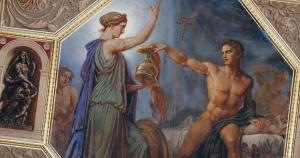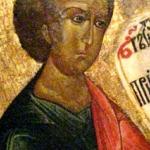I asked for new voices and got some outstanding writers! Today we hear from the erudite James R. Harrington.
 James R. Harrington earned his M.A. in Ancient History at California State University Fulleron and is a member of the Torrey Honors Institute. James has been a classical educator in a variety of settings over the past thirteen years. He lives in Houston with his wife, Sharon, and their daughter.
James R. Harrington earned his M.A. in Ancient History at California State University Fulleron and is a member of the Torrey Honors Institute. James has been a classical educator in a variety of settings over the past thirteen years. He lives in Houston with his wife, Sharon, and their daughter.
Harrington began with a series on shields in classical literature and now moves to witches as a theme.
On shields, Mr. Harrington responded to thoughts on his first post. Harrington wrote about the shield of Herakles, He continued to the shield of Aeneas and followed up on that post. We turned to a shield in Ovid. He concluded with Quintus and a follow up.
Now he turns to witches with a second post , a third, a fourth, a fabulous fifth, a sixth, a seventh, an eighth, a ninth, and now a tenth:
The Metamorphoses was far from Ovid’s only literary creation. True to form, the poet explored many innovative ways of dealing with topics both classical and contemporary. One of his most interesting compositions, the Heroides, predates Metamorphoses and gives an unprecedented voice to female characters. The Heroides are a series of fictional letters written by the women of classical literature to their mythical (and often misguided) lovers.* For the purposes of our discussion, it is interesting that Ovid includes Dido (Letter VII) and Medea (Letter XII).
Letter VII is an impassioned plea from Dido to the departing Aeneas not to leave her. While any hint of a malefic death ritual is absent from the letter, Dido does threaten to commit suicide and, in an interesting twist, asserts that she is pregnant with Aeneas’ child. Killing a child to spite a leaving lover is traditionally Medea’s claim to fame. In Medea’s letter, while she is more than willing to taunt Jason with all her witchy credentials, she is conspicuously silent about any child slaughter. Medea does, however, end with an ominous threat: she feels divine inspiration to do some further, unnamed, dastardly deed, beyond murdering Jason’s new bride. The reader, of course, knows that this will be the murder of her children by Jason.
What unites these two characters, the widow and the witch, is a furious desire to harm children in order to achieve revenge. While Dido’s letter makes no specific reference to dark rituals, the reader knows that the Queen’s suicide will seal the death curse she casts upon Aeneas and all his descendants and, according to the letter, take Aeneas’ unborn child into the underworld with her. As occult theologian Charles Williams reminds us in his study of European witch folklore, the desire to harm children and use them in magic rituals is a key trope of this lore.** Thus, Ovid preserves the unity of the two characters with their prior literary presentations, without having to repeat what his audience already knows.
By omitting Dido’s ritual and Medea’s child-murder, Ovid creates a sense of suspense in his Heroides, playing what the audience knows against what the characters don’t know. More than that, by refusing to dwell on the two women’s dark deeds, Ovid presses his audience to focus on the events and emotional upheaval that led to their maleficium. Dido is not a witch, but a deceived and abandoned woman who, as a Queen, understands full well that an insult to herself by a prince of Troy is a diplomatic insult to Carthage. Medea may be a witch, but she is one who has striven to use her powers solely for Jason’s benefit; and though she gave up everything to be with him, he has rewarded her by abandoning her for a “trophy wife.” *** As a result, the “witches” of the Heroides are complex and sympathetic, far removed from the stock characters of Ovid’s later Metamorphoses. We can only speculate what occasioned the change, but it is the novelty of female characters giving expression to their innermost thoughts and desires that make the Heroides stand out in classical literature.
———————————————
*I am indebted to a friend in classics, who introduced me to the Heroides as the only work by Ovid she didn’t hate, as well as the book’s deployment in a fascinating debate between Mary Beard and Boris Johnson: https://www.youtube.com/watch?v=2k448JqQyj8
**Charles Williams, Witchcraft. Berkeley: Apocryphile Press, 2005. pp. 60-62, 167, 171.











